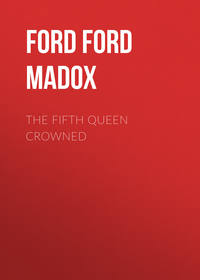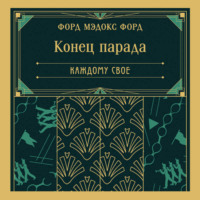 полная версия
полная версияPrivy Seal: His Last Venture
'By Bacchus!' Cromwell said, 'your Grace of Canterbury hath a jewel in your crony and helper. And again I say, we must wait upon Cleves.' He seemed to pursue the sunbeams along the gallery, then returned to say:
'I know ye know I love little to speak my mind. What I think or how I will act I keep to myself. But this I will tell you:' Cleves might have two minds in sending to France an envoy. On the one hand, he might be minded to abandon Henry and make submission to the Emperor and to Rome. For, in the end, was not the Duke of Cleves a vassal of the Emperor? It might be that. Or it might be that he was sending merely to ask the King of France to intercede betwixt him and his offended lord. The Emperor was preparing to wage war upon Cleves. That was known. And doubtless Cleves, desiring to retain his friendship with Henry, might have it in mind to keep friends with both. There the matter hinged, Cromwell repeated. For, if Cleves remained loyal to the King of England, Henry would hear nothing of divorcing Cleves' sister, and would master his desire for Katharine.
'Believe me when I speak,' Cromwell added earnestly. 'Ye do wrong to think of this King as a lecher after the common report. He is a man very continent for a king. His kingcraft cometh before all women. If the Duke of Cleves be firm friend to him, firm friend he will be to the Duke's sister. The Lady Howard will be his friend, but the Lady Howard will be neither his leman nor his guide to Rome. He will please her if he may. But his kingcraft. Never!' He broke off and laughed noiselessly at the Archbishop's face of dismay. 'Your Grace would make a pact with Rome?' he asked.
'Why, these are very evil times,' Cranmer answered. 'And if the Bishop of Rome will give way to us, why may we not give pence to the Bishop of Rome?'
'Goodman,' Cromwell answered, 'these are evil times because we men are evil.' He pulled a paper from his belt. 'Sirs,' he said, 'will ye know what manner of woman this Katharine Howard is?' and to their murmurs of assent: 'This lady hath asked to speak with me. Will ye hear her speak? Then bide ye here. Throckmorton is gone to seek her.'
V
Katharine Howard sat in her own room; it had in it little of sumptuousness, for all the King so much affected her. It was the room she had first had at Hampton after coming to be maid to the King's daughter, and it had the old, green hangings that had always been round the walls, the long oak table, the box-bed set in the wall, the high chair and the three stools round the fire. The only thing she had taken of the King was a curtain in red cloth to hang on a rod before the door where was a great draught, the leading of the windows being rotted. She had lived so poor a life, her father having been a very poor lord with many children – she was so attuned to flaws of the wind, ill-feeding and harsh clothes, that such a tall room as she there had seemed goodly enough for her. Barely three months ago she had come to the palace of Greenwich riding upon a mule. Now accident, or maybe the design of the dear saints, had set her so high in the King's esteem that she might well try a fall with Privy Seal.
She sat there dressed, awaiting the summons to go to him. She wore a long dress of red velvet, worked around the breast-lines with little silver anchors and hearts, and her hood was of black lawn and fell near to her hips behind. And she had read and learned by heart passages from Plutarch, from Tacitus, from Diodorus Siculus, from Seneca and from Tully, each one inculcating how salutary a thing in a man was the love of justice. Therefore she felt herself well prepared to try a fall with the chief enemy of her faith, and awaited with impatience his summons to speak with him. For she was anxious, now at last, to speak out her mind, and Privy Seal's agents had worked upon the religious of a poor little convent near her father's house a wrong so baleful that she could no longer contain herself. Either Privy Seal must redress or she must go to the King for justice to these poor women that had taught her the very elements of virtue and lay now in gaol.
So she spoke to her two chief friends, her that had been Cicely Elliott and her old husband Rochford, the knight of Bosworth Hedge. They happened in upon her just after she was attired and had sent her maid to fetch her dinner from the buttery.
'Three months agone,' she said, 'the King's Highness did bid me cease from crying out upon Privy Seal; and not the King's Highness' self can say that in that time I have spoken word against the Lord Cromwell.'
Cicely Elliott, who dressed, in spite of her new wedding, all in black for the sake of some dead men, laughed round at her from her little stool by the fire.
'God help you! that must have been hard, to keep thy tongue from the flail of all Papists.'
The old knight, who was habited like Katharine, all in red, because at that season the King favoured that colour, pulled nervously at his little goat's beard, for all conversations that savoured of politics and religion were to him very fearful. He stood back against the green hangings and fidgeted with his feet.
But Katharine, who for the love of the King had been silent, was now set to speak her mind.
'It is Seneca,' she said, 'who tells us to have a check upon our tongues, but only till the moment approaches to speak.'
'Aye, goodman Seneca!' Cicely laughed round at her. Katharine smoothed her hair, but her eyes gleamed deeply.
'The moment approaches,' she said; 'I do like my King, but better I like my Church.' She swallowed in her throat. 'I had thought,' she said, 'that Privy Seal would stay his harryings of the goodly nuns in this land.' But now she had a petition, come that day from Lincoln gaol. Cromwell's servants were more bitter still than ever against the religious. Here was a false accusation of treason against her foster-mother's self. 'I will soon end it or mend it, or lose mine own head,' Katharine ended.
'Aye, pull down Cur Crummock,' Cicely said. 'I think the King shall not long stay away from thy desires.'
The old knight burst in:
'I take it ill that ye speak of these things. I take it ill. I will not have 'ee lose thy head in these quarrels.'
'Husband,' Cicely laughed round at him, 'three years ago Cur Crummock had the heads of all my menfolk, having sworn they were traitors.'
'The more reason that he have not mine and thine now,' the old knight answered grimly. 'I am not for these meddlings in things that concern neither me nor thee.'
Cicely Elliott set her elbows upon her knees and her chin upon her knuckles. She gazed into the fire and grew moody, as was her wont when she had chanced to think of her menfolk that Cromwell had executed.
'He might have had my head any day this four years,' she said. 'And had you lost my head and me you might have had any other maid any day that se'nnight.'
'Nay, I grow too old,' the knight answered. 'A week ago I dropped my lance.'
Cicely continued to gaze at nothings in the fire.
'For thee,' she said scornfully to Katharine, 'it were better thou hadst never been born than have meddled between kings and ministers and faiths and nuns. You are not made for this world. You talk too much. Get you across the seas to a nunnery.'
Katharine looked at her pitifully.
'Child,' she said, 'it was not I that spoke of thy menfolk.'
'Get thyself mewed up,' Cicely repeated more hotly; 'thou wilt set all this world by the ears. This is no place for virtues learned from learned books. This is an ill world where only evil men flourish.'
The old knight still fidgeted to be gone.
'Nay,' Katharine said seriously, 'ye think I will work mine own advantage with the King. But I do swear to thee I have it not in my mind.'
'Oh, swear not,' Cicely mumbled, 'all the world knoweth thee to be that make of fool.'
'I would well to get me made a nun – but first I will bring nunneries back from across the seas to this dear land.'
Cicely laughed again – for a long and strident while.
'You will come to no nunnery if you wait till then,' she said. 'Nuns without their heads have no vocation.'
'When Cromwell is down, no woman again shall lose her head,' Katharine answered hotly.
Cicely only laughed.
'No woman again!' Katharine repeated.
'Blood was tasted when first a queen fell on Tower Hill.' Cicely pointed her little finger at her. 'And the taste of blood, even as the taste of wine, ensureth a certain oblivion.'
'You miscall your King,' Katharine said.
Cicely laughed and answered: 'I speak of my world.'
Katharine's blood came hot to her cheeks.
'It is a new world from now on,' she answered proudly.
'Till a new queen's blood seal it an old one,' Cicely mocked her earnestness. 'Hadst best get thee to a nunnery across the seas.'
'The King did bid me bide here.' Katharine faltered in the least.
'You have spoken of it with him?' Cicely said. 'Why, God help you!'
Katharine sat quietly, her fair hair gilded by the pale light of the gusty day, her lips parted a little, her eyelids drooping. It behoved her to move little, for her scarlet dress was very nice in its equipoise, and fain she was to seem fine in Privy Seal's eyes.
'This King hath a wife to his tail,' Cicely mocked her.
The old knight had recovered his quiet; he had his hand upon his haunch, and spoke with his air of wisdom:
'I would have you to cease these talkings of dangerous things,' he said. 'I am Rochford of Bosworth Hedge. I have kept my head and my lands, and my legs from chains – and how but by leaving to talk of dangerous things?'
Katharine moved suddenly in her chair. This speech, though she had heard it a hundred times before, struck her now as so craven that she forgot alike her desire to keep fine and her friendship for the old man's new wife.
'Aye, you have been a coward all your life,' she said: for were not her dear nuns in Lincoln gaol, and this was a knight that should have redressed wrongs!
Old Rochford smiled with his air of tranquil wisdom and corpulent age.
'I have struck good blows,' he said. 'There have been thirteen ballads writ of me.'
'You have kept so close a tongue,' Katharine said to him hotly, 'that I know not what you love. Be you for the old faith, or for this Church of devils that Cromwell hath set up in the land? Did you love Queen Katharine or Queen Anne Boleyn? Were you glad when More died, or did you weep? Are you for the Statute of Users, or would you end it? Are you for having the Lady Mary called bastard – God pardon me the word! – or would you defend her with your life? – I do not know. I have spoken with you many times – but I do not know.'
Old Rochford smiled contentedly.
'I have saved my head and my lands in these perilous times by letting no man know,' he said.
'Aye,' Katharine met his words with scorn and appeal. 'You have kept your head on your shoulders and the rent from your lands in your poke. But oh, sir, it is certain that, being a man, you love either the new ways or the old; it is certain that, being a spurred knight, you should love the old ways. Sir, bethink you and take heed of this: that the angels of God weep above England, that the Mother of God weeps above England; that the saints of God do weep – and you, a spurred knight, do wield a good sword. Sir, when you stand before the gates of Heaven, what shall you answer the warders thereof?'
'Please God,' the old knight answered, 'that I have struck some good blows.'
'Aye; you have struck blows against the Scots,' Katharine said. 'But the beasts of the field strike as well against the foes of their kind – the bull of the herd against lions; the Hyrcanian tiger against the troglodytes; the basilisk against many beasts. It is the province of a man to smite not only against the foes of his kind but – and how much the more? – against the foes of his God.'
In the full flow of her speaking there came in the great, blonde Margot Poins, her body-maid. She led by the hand the Magister Udal, and behind them followed, with his foxy eyes and long, smooth beard, the spy Throckmorton, vivid in his coat of green and scarlet stockings. And, at the antipathy of his approach, Katharine's emotions grew the more harrowing – as if she were determined to shew this evil supporter of her cause how a pure fight should be waged. They moved on tiptoe and stood against the hangings at the back.
She stretched out her hands to the old knight.
'Here you be in a pitiful and afflicted land from which the saints have been driven out; have you struck one blow for the saints of God? Nay, you have held your peace. Here you be where good men have been sent to the block: have you decried their fates? You have seen noble and beloved women, holy priests, blessed nuns defiled and martyred; you have seen the poor despoiled; you have seen that knaves ruled by aid of the devil about a goodly king. Have you struck one blow? Have you whispered one word?'
The colour rushed into Margot Poins' huge cheeks. She kept her mouth open to drink in her mistress's words, and Throckmorton waved his hands in applause. Only Udal shuffled in his broken-toed shoes, and old Rochford smiled benignly and tapped his chest above the chains.
'I have struck good blows in the quarrels that were mine,' he answered.
Katharine wrung her hands.
'Sir, I have read it in books of chivalry, the province of a knight is to succour the Church of God, to defend the body of God, to set his lance in rest for the Mother of God; to defend noble men cast down, and noble women; to aid holy priests and blessed nuns; to succour the despoiled poor.'
'Nay, I have read no books of chivalry,' the old man answered; 'I cannot read.'
'Ah, there be pitiful things in this world,' Katharine said, and her chest was troubled.
'You should quote Hesiodus,' Cicely mocked her suddenly from her stool. 'I marked this text when all my menfolk were slain: πλεἱη μὲν γὰρ γᾶια, πλεἱη δέ θὰλασσα so I have laughed ever since.'
Upon her, too, Katharine turned.
'You also,' she said; 'you also.'
'No, before God, I am no coward,' Cicely Elliott said. 'When all my menfolk were slain by the headsman something broke in my head, and ever since I have laughed. But before God, in my way I have tried to plague Cromwell. If he would have had my head he might have.'
'Yet what hast thou done for the Church of God?' Katharine said.
Cicely Elliott sprang to the floor and raised her hands with such violence that Throckmorton moved swiftly forward.
'What did the Church of God for me?' she cried. 'Guard your face from my nails ere you ask me that again. I had a father; I had two brothers; I had two men I loved passing well. They all died upon one day upon the one block. Did the saints of God save them? Go see their heads upon the gates of York?'
'But if they died for God His pitiful sake,' Katharine said – 'if they did die in the quarrel of God's wounds – '
Cicely Elliott screamed, with her hands above her head.
'Is that not enow? Is that not enow?'
'Then it is I, not thou, that love them,' Katharine said; 'for I, not thou, shall carry on the work for which they died.'
'Oh gaping, pink-faced fool!' Cicely Elliott sneered at her.
She began to laugh, holding her black sides in, her face thrown back. Then she closed her mouth and stood smiling.
'You were made for a preacher, coney,' she said. 'Fine to hear thee belabouring my old, good knight with doughty words.'
'Gibe as thou wilt; scream as thou wilt – ' Katharine began. Cicely Elliott tossed in on her words:
'My head ached so. I had the right of it to scream. I cannot be minded of my menfolk but my head will ache. But I love thy fine preaching. Preach on.'
Katharine raised herself from her chair.
'Words there must be that will move thee,' she said, 'if God will give them to me.'
'God hath withdrawn Himself from this world,' Cicely answered. 'All mankind goeth a-mumming.'
'It was another thing that Polycrates said.' Katharine, in spite of her emotion, was quick to catch the misquotation.
'Coney,' Cicely Elliott answered, 'all men wear masks; all men lie; all men desire the goods of all men and seek how they may get them.'
'But Cromwell being down, these things shall change,' Katharine answered. 'Res, aetas, usus, semper aliquid apportent novi.'
Cicely Elliott fell back into her chair and laughed.
'What are we amongst that multitude?' she said. 'Listen to me: When my menfolk were cast to die, I flew to Gardiner to save them. Gardiner would not speak. Now is he Bishop of Winchester – for he had goods of my father's, and greased with them the way to his bishop's throne. Fanshawe is a goodly Papist; but Cromwell hath let him have goods of the Abbey of Bright. Will Fanshawe help thee to bring back the Church? Then he must give up his lands. Will Cranmer help thee? Will Miners? Coney, I loved Federan, a true man: Miners hath his land to-day, and Federan's mother starves. Will Miners help thee to gar the King do right? Then the mother of my love Federan must have Miners' land and the rents for seven years. Will Cranmer serve thee to bring back the Bishop of Rome? Why, Cranmer would burn.'
'But the poorer sort – ' Katharine said.
'There is no man will help thee whose help will avail,' Cicely mocked at her. 'For hear me: No man now is up in the land that hath not goods of the Church; fields of the abbeys; spoons made of the parcel gilt from the shrines. There is no rich man now but is rich with stolen riches; there is no man now up that was not so set up. And the men that be down have lost their heads. Go dig in graves to find men that shall help thee.'
'Cromwell shall fall ere May goeth out,' Katharine said.
'Well, the King dotes upon thy sweet face. But Cromwell being down, there will remain the men he hath set up. Be they lovers of the old faith, or thee? Now, thy pranks will ruin all alike.'
'The King is minded to right these wrongs,' Katharine protested hotly.
'The King! The King!' Cicely laughed. 'Thou lovest the King… Nay an thou lovest the King… But to be enamoured of the King… And the King enamoured of thee … why, this pair of lovers cast adrift upon the land – '
Katharine said:
'Belike I am enamoured of the King: belike the King of me, I do not know. But this I know: he and I are minded to right the wrongs of God.'
Cicely Elliott opened her eyes wide.
'Why, thou art a very infectious fanatic!' she said. 'You may well do these things. But you must shed much blood. You must widow many men's wives. Body of God! I believe thou wouldst.'
'God forbid it!' Katharine said. 'But if He so willeth it, fiat voluntas.'
'Why, spare no man,' Cicely answered. 'Thou shalt not very easily escape.'
It was at this point that the magister was moved to keep no longer silence.
'Now, by all the gods of high Olympus!' he cried out, 'such things shall not be alleged against me. For I do swear, before Venus and all the saints, that I am your man.'
Nevertheless, it was Margot Poins, wavering between her love for her magister and her love for her mistress, that most truly was carried away by Katharine's eloquence.
'Mistress,' she said, and she indicated both the magister and his tall and bearded companion, 'these two have made up a pretty plot upon the stairs. There are in it papers from Cleves and a matter of deceiving Privy Seal and thou shouldst be kept in ignorance asking to – to – '
Her gruff voice failed and her blushes overcame her, so that she wanted for a word. But upon the mention of papers and Privy Seal the old knight fidgeted and faltered:
'Why, let us begone.' Cicely Elliott glanced from one to the other of them with a malicious glee, and Throckmorton's eyes blinked sardonically above his beard.
It had been actually upon the stairs that he had come upon the magister, newly down from his horse, and both stiff and bruised, with Margot Poins hanging about his neck and begging him to spare her a moment. Throckmorton crept up the dark stairway with his shoes soled with velvet. The magister was seeking to disengage himself from the girl with the words that he had a treaty form of the Duke of Cleves in his bosom and must hasten on the minute to give it to her mistress.
'Before God!' Throckmorton had said behind his back, 'ye will do no such thing,' and Udal had shrieked out like a rabbit caught by a ferret in its bury. For here he had seemed to find himself caught by the chief spy of Privy Seal upon a direct treason against Privy Seal's self.
But, dragging alike the terrified magister and the heavy, blonde girl who clung to him out from the dark stairhead into the corridor, where, since no one could come upon them unseen or unheard, it was the safest place in the palace to speak, Throckmorton had whispered into his ear a long, swift speech in which he minced no matters at all.
The time, he said, was ripe to bring down Privy Seal. He himself – Throckmorton himself – loved Kat Howard with a love compared to which the magister's was a rushlight such as you bought fifty for a halfpenny. Privy Seal was ravening for a report of that treaty. They must, before all things, bring him a report that was false. For, for sure, upon that report Privy Seal would act, and, if they brought him a false report, Privy Seal would act falsely.
Udal stood perfectly still, looking at nothing, his thin brown hand clasped round his thin brown chin.
'But, above all,' Throckmorton had concluded, 'show ye no papers to Kat Howard. For it is very certain that she will have no falsehoods employed to bring down Privy Seal, though she hate him as the Assyrian cockatrice hateth the symbol of the Cross.'
'Sir Throckmorton,' Margot Poins had uttered, 'though ye be a paid spy, ye speak true words there.'
He pulled his beard and blinked at her.
'I am minded to reform,' he said. 'Your mistress hath worked a miracle of conversion in me.'
She shrugged her great fair shoulders at this, and spoke to the magister:
'It is very true,' she said, 'that this spying knight affects my mistress. But whether it be for the love of virtue, or for the love of her body, or because the cat jumps that way and there he observeth fortune to rise, I leave to God who reads all hearts.'
'There speaks a wench brought up and taught by Protestants,' Throckmorton gibed pleasantly at her; 'or ye have caught the trick of Kat Howard, who, though she be a Papist as good as I, yet prates virtue like a Lutheran.'
'Ye lie!' Margot said; 'my mistress getteth her virtue from good letters.'
Throckmorton smiled at her again.
'Wench,' he said, 'in all save doctrine, this Kat Howard and her learning are nearer Lutheran than of the old faith.'
With his malice he set himself to bewilder Margot. They made a little, shadowy knot in the long corridor. For he wished to give Udal, who in his long gown stood deaf-faced, like a statue of contemplation, the time to come to a conclusion.
'Why, you are a very mean wag,' Margot said. 'I have heard my uncle – who is, as ye wot, a Protestant and a printer – I have heard him speak of Luther and of Bucer and of the word of God and suchlike canting books, but never once of Seneca and Tully, that my mistress loves.'
'Why, ye are learning the trick of tongues,' Throckmorton mocked. 'Please God, when your mistress cometh to be Queen – may He send it soon! – there shall be such a fashion and contagion of talking – '
Having his eyes on Udal, he broke off suddenly, and said with a harsh sharpness:
'I have given you time to make a resolution. Speak quickly. Will you come into our boat with us that will bring down Privy Seal?'
Udal winced, but Throckmorton held him by the wrist.
'Then unpouch quickly thy Cleves papers,' he said; 'we have but a little time to turn them round.'
Udal's thin hand sought nervously the opening of his jerkin beneath his gown: he drew it back, moved it forward again, and stood quivering with doubt.
Throckmorton stood vaingloriously back upon his feet and combed his great beard with his white fingers.
'Magister,' he uttered triumphantly, 'well you wot that such a man as you cannot plot for himself alone; you will make naught of your treasure trove save a cleft neck!'
And, furtively, cringing back into the dark hangings, a bent, broken figure like a miser unpouching his gold, Udal undid his breast lacings.









